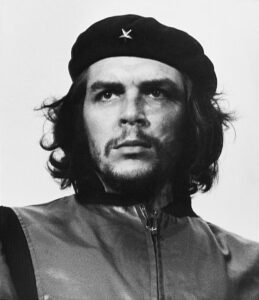
Janette Habel and Michael Löwy defend the political and intellectual legacy of Che Guevara as a Marxist, against Samuel Farber’s critique.
MICHAEL LÖWY, a French citizen born in Brazil, is research director (emeritus) at the National Center for Scientific Research and professor at the École des hautes études en sciences sociales. He is the author of numerous books published in twenty-nine languages, including Ecosocialism: A Radical Alternative to Capitalist Catastrophe, Marxism and Liberation Theology, Fatherland or Mother Earth? and The War of Gods: Religion and Politics in Latin America.

Janette Habel and Michael Löwy defend the political and intellectual legacy of Che Guevara as a Marxist, against Samuel Farber’s critique.
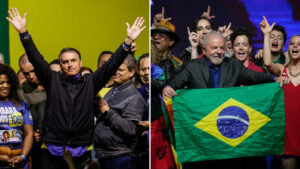
In addition, Lula will be, like Dilma Rousseff, under the permanent threat of a “parliamentary coup.”
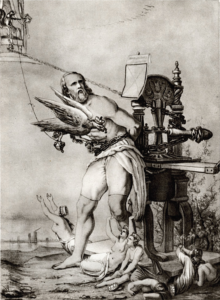
“This small book is a very useful account of how Marx came to develop his materialist conception of history.” Michael Löwy reviews Eric Rahim, “A Promethean Vision: The Formation of Karl Marx’s Worldview” (Glasgow: Praxis Press, 2020).
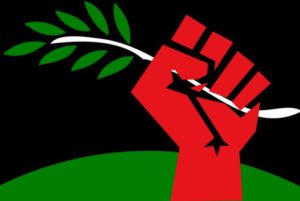
I. The ecological crisis is already the most important social and political question of the 21st century, and will become even more so in the coming months and years. The future of the planet, and thus of humanity, will be determined in . . .
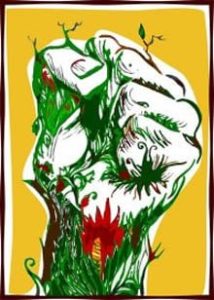
There is a growing body of ecomarxist and ecosocialist literature in the English-speaking world, which signals the beginning of a significant turn in radical thinking.
 Rosa Luxemburg’s defense of socialist democracy and her critique of the Bolsheviks in her pamphlet The Russian Revolution (1918) are well known. Less well known and often forgotten is her critique of bourgeois democracy, its limits, its contradictions, and its narrow and partial character. We propose to examine this critical line of thought in some of her political writings without any pretentions to completeness.
Rosa Luxemburg’s defense of socialist democracy and her critique of the Bolsheviks in her pamphlet The Russian Revolution (1918) are well known. Less well known and often forgotten is her critique of bourgeois democracy, its limits, its contradictions, and its narrow and partial character. We propose to examine this critical line of thought in some of her political writings without any pretentions to completeness.
This book is a fascinating incursion into the multiple oppositional uses of memory in world cinema. It shows, in a lively and insightful way, how movies bring the memory of past struggles forward into the present, to serve as an inspiration for the future.
Inez Hedges distinguishes eight types of cultural cinematographic memory, which correspond to the eight chapters of the book:
.jpg)
Let’s call a spade a spade. What has just happened in Brazil, with the dismissal of the elected president, Dilma Rousseff, is a coup. A coup which is pseudo-legal, “constitutional”, “institutional”, parliamentary, anything you want, but a coup all the same.
 Jacobs’ The Frankfurt School is an outstanding piece of scholarship.
Jacobs’ The Frankfurt School is an outstanding piece of scholarship.
INFAMY. That is the only word that can sum up how we feel about the the murder of our buddies at Charlie Hebdo. A crime made even more hateful because these comrade artists were people on the left, anti-racists, anti-fascists, anti-colonialists, sympathizers with communism and anarchism. It was only recently that they participated in an homage to the memory of a group of Algerians assassinated by the French police in Paris on October 17, 1961.
 Ecosocialism is an attempt to provide a radical, civilizational alternative to capitalism, rooted in the basic arguments of the ecological movement, and in the Marxist critique of political economy. It opposes to capitalism’s destructive progress (Marx) an economic policy founded on non-monetary and extra-economic criteria: social needs and ecological equilibrium.
Ecosocialism is an attempt to provide a radical, civilizational alternative to capitalism, rooted in the basic arguments of the ecological movement, and in the Marxist critique of political economy. It opposes to capitalism’s destructive progress (Marx) an economic policy founded on non-monetary and extra-economic criteria: social needs and ecological equilibrium.

There seems to exist a secret complicity between the rediscovery of Rosa Luxemburg and rebellious times. The last period when her life and writings raised much interest was in the 1960s and 70s, during the “street-fighting years” (Tariq Ali’s expression). Could the recent publication of several of her works, in many parts of the world, be the sign of a new “critical” epoch? In the English speaking world, the good news is the project of publishing The Complete Works of Rosa Luxemburg in fourteen volumes, five of which only with her correspondence.
This remarkable piece of militant history, based on interviews, as well as leaflets, letters, manifestos, dug out of public archives and private collections, from the heights of La Paz to the outskirts of Paris, deals with the Bolivian labor movement, the most persistent and combative in the Western Hemisphere. Bolivia is one of the very poorest countries of the Americas, and also the most Indian: 2/3 of the population describes itself as indigenous.
This truly path-breaking book goes against the grain of the conventional wisdom which reduces Marx to an Eurocentric and economistic thinker; as Douglas Kellner comments, Kevin Anderson shows that Marx “is the sophisticated and original theorist of history some might not have ever expected him to be.” Analyzing a variety of Marx’s writings, including his journalistic work written for the New York Daily Tribune as well as unpublished material on non-European societies, it brings to the fore a global theorist whose soci
In spite of their undeniable differences, Marx and Weber have much in common in their understanding of modern capitalism: they both perceive it as a system where "the individuals are ruled by abstractions (Marx), where the impersonal and "thing-like" (Versachlicht) relations replace the personal relations of dependence, and where the accumulation of capital becomes an end in itself, largely irrational.